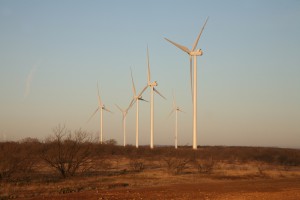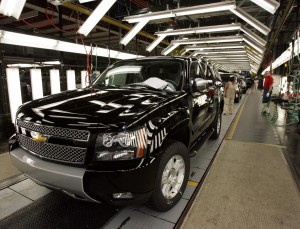
GM signed a power purchase agreement with Renewable Energy Systems to source 50 megawatts of wind energy to power 16 sites with 100% renewable energy.
GM recently made what the company describes as its largest purchase of renewable energy to date by purchasing enough wind power to equal the electricity needs of 16 of its U.S. facilities, including the Arlington assembly and stamping, GM business offices in Fort Worth and Austin, Texas, and 13 parts warehouses east of the Mississippi River.
“GM’s commitment to renewable energy is helping transform the way electricity is produced, distributed and consumed around the world, and we’re doing it in a way that makes our company and communities stronger,” said Rob Threlkeld, GM global manager of Renewable Energy.
“These renewable energy investments drive down greenhouse gas emissions, reduce our dependence on finite resources, and help keep our air and water clean.”
GM will draw its energy from wind power through an agreement with Renewable Energy Systems Group, a global renewable energy and energy storage development and construction company.
GM will purchase 50 megawatts of power produced at Cactus Flats, a 150-megawatt wind farm being developed by RES in Concho County, Texas.
(GM commits to 100% renewable energy at plants worldwide. Click Herefor the story.)
“Investing in Texas wind energy is an important step on a journey that will see clean, renewable sources account for 100% of GM’s global energy footprint by 2050,” Threlkeld said.
In September, GM announced its commitment to use only renewable energy at its plants worldwide. To date, most of its renewable energy comes from solar power.
“Establishing a 100% renewable energy goal helps us better serve society by reducing environmental impact,” says GM Chairman and CEO Mary Barra. “This pursuit of renewable energy benefits our customers and communities through cleaner air while strengthening our business through lower and more stable energy costs.”
GM has already taken a number of small steps in the switch to renewable energy. At the Detroit-Hamtramck Assembly Plant, where it produces a mix of models including the Chevrolet Volt, for example, a large solar array provides electric power used, among other things, to charge up those plug-in hybrids.
By the time the contract with RES is phased in begins in the first half of 2018, 6% of GM’s global energy use will be powered by renewable energy.
Starting in 2018, GM will source more than 193,000 megawatt hours of electricity from wind annually, which is enough to power the Austin IT Innovation Center, a GM Financial office in Fort Worth as well as all the warehouses, Threlkeld said.
(Click Here for details about GM’s expected earnings improvement for the second half of 2016.)
GM’s Arlington Assembly already gets 50% of its energy from renewable sources, Threlkeld said. GM worked with Altenex, an Edison Energy company, and an independent renewable energy advisor, to identify renewable energy projects in the Texas market and execute the deal.
“RES is proud to support General Motors in reaching its 100% renewable energy goal,” said Glen Davis, CEO of RES in the Americas. “RES brings decades of experience to GM and other companies to reduce their carbon footprint and secure low-cost renewable energy for the future.”
GM is a founding member of the Business Renewable Council, an organization backed by the Rocky Mountain Institute that streamlines and accelerates corporate purchasing of wind and solar energy.
In addition to an anticipated 114 megawatts of wind power. GM also now hosts 24 solar installations around the world and is the leading automotive user of solar energy in the U.S., according to a report by the Solar Energy Industries Association.
GM, looking to take a leadership position, joined RE100, a collaborative effort of 83 global companies pledging to switch entirely to renewable energy. The list includes Google, HP, IKEA and one other automaker, BMW.
(To see more about Mary Barra new role helping the incoming Trump administration, Click Here.)
“GM has already saved millions of dollars by using renewable energy, and like any smart business that recognizes an investment opportunity, they want to seize it fully,” said Amy Davidsen, North America executive director at the nonprofit The Climate Group. “We hope that through this leadership, other heavy manufacturing companies will be inspired to make the switch too.”

